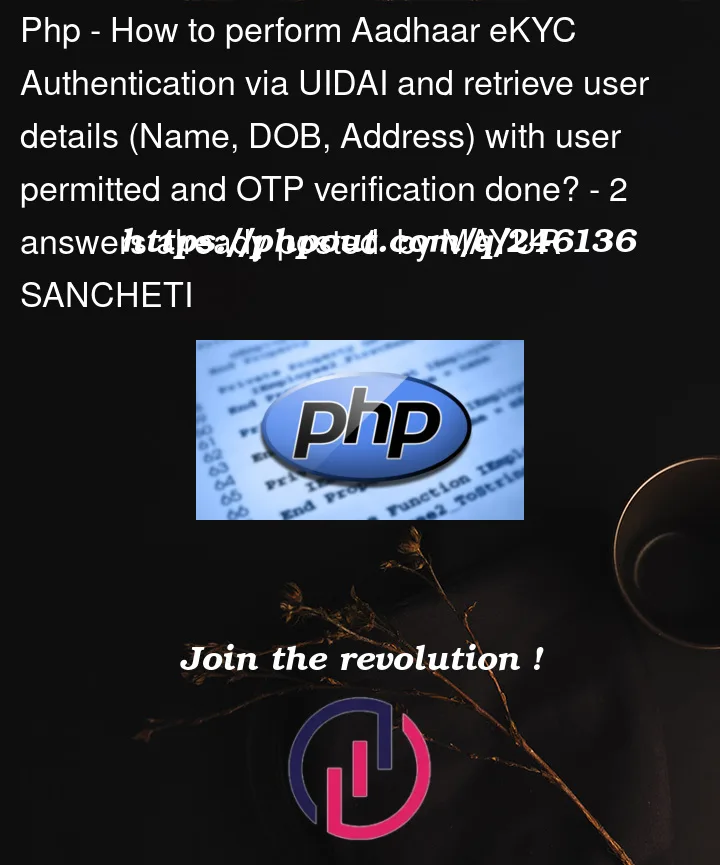Concept – I am making web portal in which i want to add aadhaar authentication and get user detail( name, dob and address), if user permitted and verifies OTP then only.
language use – php, curl
Simple Example –
EPFO portal user enter his aadhaar number and check, user receive OTP from UIDAI. if valid then get name, birthdate, addresss, like this simple functionality want to build in PHP.
Error is –
Error Number – 6 Could not resolve host: auth.uidai.gov.in; Name or service not known
here
I refer below link —
- https://uidai.gov.in/images/resource/Aadhaar_Authentication_API-2.5_Revision-1_of_January_2022.pdf
- https://www.uidai.gov.in/en/916-developer-section/data-and-downloads-section/11350-testing-data-and-license-keys.html
- uidai.gov.in/images/resource/aadhaar_otp_request_api_2_5.pdf
- Similar functionality already exist in https://unifiedportal-mem.epfindia.gov.in/memberinterface/ — to verify aadhaar and get his detail once user permitted, i need similar functionality , when user permitted then only get name, DOB, address.
I tried below code but not work,
<?php
/** * https://uidai.gov.in/images/resource/Aadhaar_Authentication_API-2.5_Revision-1_of_January_2022.pdf */
$adhar_card_no = "123456789012";
function checkurl($adhar_card_no)
{
$host = "https://auth.uidai.gov.in";
$version = "2.5";
$aua = "public";
$asalk = "MAvSQG0jKTW4XxQc2cI-oXZYxYH-zi7IWmsQY1q3JNLlC8VOWOHYGj8";
$uid = str_split($adhar_card_no);
$url = $host."/".$version."/".$aua."/".$uid[0]."/".$uid[1]."/".$asalk;
return $url;
}
$request_url = checkurl($adhar_card_no);
function requestDataBuilder($uid)
{
$encrypted_encoded_session_key = "";
$encrypted_pid_block = "";
$sha256_pid_bloc_encrypted_encoded= "";
$digital_aua_signatrure= "";
$auth_data = [
"uid" => $uid, //Adhaar Card No.
"tid" => "", //Terminal Id for registered device else public
"ac" => "", //10 char unique code, public for testing
"sa" => "", //max length 10, same as ac possible
"ver" => 1.6, //Current version
"txn" => "", //AUA transaction identifier. max length 50, not U*
"lk" => "", //Valid License Key, max length 64
];
$uses_data = [ "pi" => "n", "pa" => "n", "pfa" => "n", "bio" => "n", "bt" => "n", "pin" => "n", "otp" => "n" ];
$tkn_data = [
"type" => "001", //only this option available for now which is mobile no.
"value" => "9595792282" //Mobile no. 10 digit only no prefix
];
$meta_data = [
"udc" => "123456477699", //[vendorcode]September 19, 2023[serial number] max length 20
"fdc" => "NA", //Fingerprint device code. use NA or NC or given code
"idc" => "NA", //Iris device code, us na or NC
"pip" => "NA", //Public IP address of the device, or NA
"lot" => "P", //G -lat long format. p for pincode format
"lov" => "110025" // value as per G and P- my pin change it
];
$skey_data = [
"ci" => "", //Public key certificate Identifier --mandatory
"ki" => "" //This is for advanced use only, --optional
];
$format = '<Auth uid="'.$auth_data['uid'].'" tid ="'.$auth_data['tid'].'" ac="'.$auth_data['ac'].'" sa="'.$auth_data['sa'].'" ver="'.$auth_data['ver'].'" txn="'.$auth_data['txn'].'" lk="'.$auth_data['lk'].'">';
$format.= '<Uses pi="'.$uses_data['pi'].'" pa="'.$uses_data['pa'].'" pfa="'.$uses_data['pfa'].'" bio="'.$uses_data['bio'].'" bt="'.$uses_data['bt'].'" pin="'.$uses_data['pin'].'" otp="'.$uses_data['otp'].'"/>';
$format.= '<Tkn type="'.$tkn_data['type'].'" value="'.$tkn_data['value'].'"/>';
$format.= '<Meta udc="'.$meta_data['udc'].'" fdc="'.$meta_data['fdc'].'" idc="'.$meta_data['idc'].'" pip="'.$meta_data['pip'].'" lot="'.$meta_data['lot'].'" lov="'.$meta_data['lov'].'"/>';
$format.= '<Skey ci="'.$skey_data['ci'].'" ki="'.$skey_data['ci'].'">'.$encrypted_encoded_session_key.'</Skey>';
$format.= '<Data type="X">'.$encrypted_pid_block.'</Data>';
$format.= '<Hmac>'.$sha256_pid_bloc_encrypted_encoded.'</Hmac>';
$format.= '<Signature>'.$digital_aua_signatrure.'</Signature></Auth>';
return $format;
}
$request_url = checkurl($adhar_card_no);
$data_to_send = requestDataBuilder($adhar_card_no);
//setting the curl parameters.
$ch = curl_init();
$curl_options = [ CURLOPT_URL => $request_url, CURLOPT_VERBOSE => 1, CURLOPT_SSL_VERIFYHOST => 0, CURLOPT_SSL_VERIFYPEER => 0, CURLOPT_POST => 1, CURLOPT_RETURNTRANSFER => 1, CURLOPT_HTTPHEADER => array('Content-Type: application/xml'), CURLOPT_POSTFIELDS => $data_to_send ];
curl_setopt_array($ch, $curl_options);
curl_setopt( $ch, CURLOPT_IPRESOLVE, CURL_IPRESOLVE_V4);
$response = curl_exec($ch);
if (curl_errno($ch)) {
// moving to display page to display curl errors
echo 'Error Number - '.curl_errno($ch).'<br/>';
echo curl_error($ch);
echo '<br/> here';
} else {
echo $response;
print_r($response);
}
curl_close($ch);
?>
this code not get any OTP , name, DOB from aadhaar.
please help someone, any suggestion.




2
Answers
Refer to this sample code. It has the logic of encrypting the XML body. Just download the staging/testing certificates from the official documentation.
Encourage private companies, such as Surepass and Signzy, to provide API gateways.
Given the sensitivity of Aadhar data, the government is not permitting its use for testing purposes in this context.
Although we attempted to use API-Setu, we encountered frequent service disruptions.